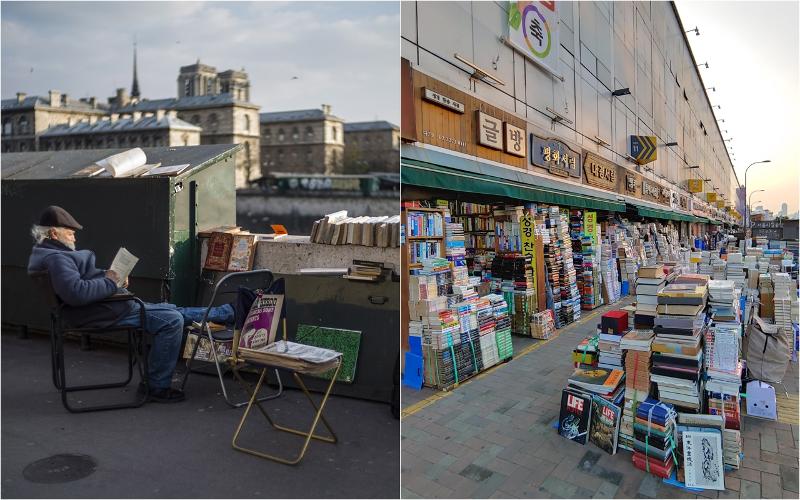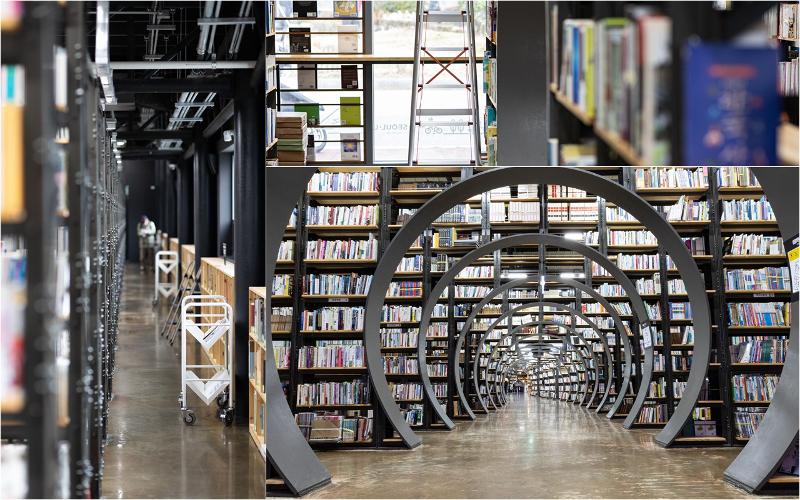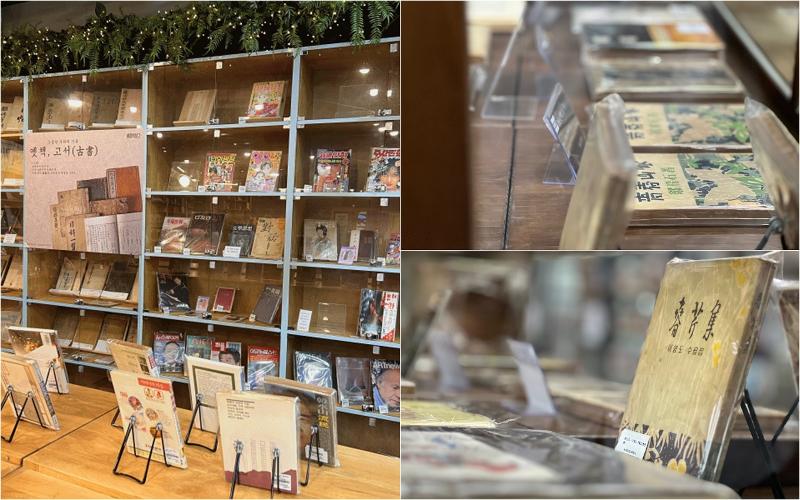Secondhand books are also precious vessels containing human life, spirit, history and culture. Amid the digital media age that solely emphasizes speed and efficiency, thorough examination of age-old wisdom in the faded orange pages of such books can make their implied meaning and value more special.
By Gil Kyouyoung and Wu Jinhua
Walking along the Seine River running through Paris leads to a green bookstall. The bouquinistes is a mainstay of the French capital that dates back to the 16th century.
A bouquiniste is a street kiosk selling used and antique books, pictures and postcards in green boxes. The term is derived from "bouquin," or old books or manuscripts.
Designated an intangible cultural asset in 2019, such businesses were almost destroyed by the city government because the opening ceremony for this year's Paris Summer Olympics is slated to be held around the Seine.
With over 400 years of history, the longstanding landmark barely survived thanks to opposition and resistance by the public including bouquinistes owners. This also shone the spotlight again on the value of used books.
So why do people want to preserve and protect old books? The importance of time for such books is too thick and heavy to define their value merely by age.
In Korea, used bookstores in the form of street stalls debuted after national liberation from Japanese colonial rule in 1945 and the Korean War (1950-53), mainly catering to the working class. Such businesses saw their heyday with the nation's rapid industrialization in the 1970s.

A bouquiniste is a street vendor in Paris selling used books, old manuscripts, pictures and envelopes in green boxes along the Seine River; the business goes as far back as the 16th century. In Korea, such a business appeared after national liberation from Japanese colonial rule in 1945 and the Korean War (1950-53), mainly for the working class, and peaked during the country's rapid industrialization in the 1970s. On the left is a bouquiniste along the Seine and on the right are used book sellers along Cheonggyecheon Stream in Seoul. (Yonhap News and Cheonggyecheon Museum)
About 200 used bookstores once prospered on a famous used bookstore street by Cheonggyecheon Stream in Seoul, with an average of 20,000 visitors per day. Given the hard economic times back then, consumers preferred used books over more expensive new ones, thus large crowds with residents from all over the country gathered at such stores.
Pursuing their dreams at the businesses included students looking for textbooks and intellectuals yearning for democracy. Thus a used bookstore was not only a place to trade such books but also a venue for the exchange of knowledge and talent.
Like the Korean expression hwamushipilhong (No flower stays red for 10 days) meaning nothing lasts forever, the once-prosperous sector for used bookstores lost their vitality with the dawn of the digital era, plunging the publishing market centered on paper books into an unprecedented crisis.
The sector expectedly suffered gradual decline. Fears arose over the end of the paper book era due to the surge in online content consumption centered on digital media and lower demand for printed works, and such concerns materialized as the number of used bookstores nosedived.
The situation was the same abroad. In France, the country's leading used bookstore Shakespeare and Company with a 100-year history, struggled during to the COVID-19 pandemic. It eventually survived by pioneering online sales but the reality of the market still frustrated many.
In that sense, Japan has given reason for hope. Jinbocho, the world's largest street for used bookstores, remains popular among locals and foreign tourists as a place that sells more than used books.
This complex cultural space houses a variety of cultures united by used books. Stressing coexistence over competition, the street is a treasure island for bibliophiles to leisurely spend time led by demand for used books.
Korea is also high on this trend. Seoul for a long time has promoted the revival of used books and related culture. In 2013, the city designated the used bookstore street around Cheonggyecheon Stream as Seoul Future Heritage.
The idea was an agreement between the city and the public to guarantee the people's right to enjoy culture and consider common memories and recollections of the past as cultural heritage to pass on to future generations through used books.
Going a step further, public used bookstores with systems unique to Korea appeared. A leading example is Seoul Book Bogo, which marks its fifth anniversary this year after being opened in 2019 by the Seoul Metropolitan Government and Seoul Library.

The arched bookshelves at Seoul Book Bogo represent bookworms. (Seoul Book Bogo)
An unused warehouse was renovated by the city into Seoul Book Bogo, which sells books from 33 used bookstores and whose collection spans 130,000 books. This is thus a one-stop source of items from used bookstores from around the nation.
Unlike general bookstores or libraries that categorize books by title and genre, Seoul Book Bogo uses its used bookstores. This is to preserve each venue's identity while maintaining its analog sensibility.
The focus is also on offering chance encounters with books via the aesthetics of slowness amid modern society's emphasis on speed and efficiency.
Defying concerns, Seoul Book Bogo was immensely successful by averaging 8,500 visitors per week in 2019, the year before the COVID-19 pandemic. Senior citizens were expected to mostly frequent the stores, but surprisingly women in their 20s to 40s or families rose thanks to social media.
Many foreign tourists also visit this library after seeing it in globally popular K-dramas like "Hotel del Luna" on streaming sites.
Lee Han-soo, head of the planning team at Seoul Book Bogo, said of this success, "The older generation gets nostalgia over used books, while the younger generation sees them as a new culture and experience they read about only in books or see in videos."

Seoul Book Bogo hosts free programs every month like exhibitions, lectures and performances as well as sell used books. (Wu Jinhua)
Used books are no longer simply left in a closet to collect dust. They are now deemed cultural assets whose value must be acknowledged, protected and preserved.
Data from the Paris Book Festival said the used bookstore market in France has expanded over the past few years. As of 2022, 80 million used books were traded for sales of EUR 350 million.
As of last year, France had around 2,000 used bookstores with annual sales of EUR 200 million to 300 million, said Jean-Marc Dechaud, head of SLAM, aka the National Union of Ancient and Modern Bookstores.
"Countries consider used books as antiques and trading them via auctions, thus forming an ecosystem of used books to coexist with large bookstores," Lee said. "Korea has yet to launch a full-fledged used bookstore market, but exchange of valuable used books is active especially among aficionados, and this is slowly spreading."
Hyeon Man-soo, CEO of Christian Bookstore who has been in the sector around Cheonggyecheon for 35 years, said, "If used bookstores do well, they can help the publishing industry survive and develop cultural diversity; to coexist, we must work together like cogs in a machine."
He emphasized the importance of ensuring the survival of used books and bookstores, saying, "With so many books being published and disappearing every day, used books are the most valuable as chosen by readers."
Perhaps an era in which the public seriously ponders the value of used books is coming.
jane0614@korea.kr